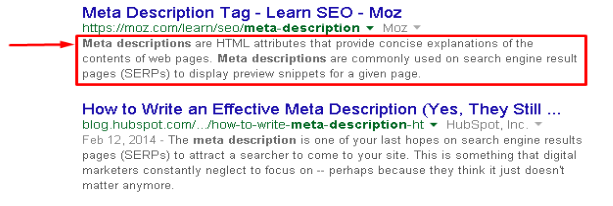Often overlooked, meta descriptions are an important part of driving traffic to your web page. These brief descriptions, beneath a page title in search engine results, tell readers what they’ll find on your site, establishing your page as the solution they are seeking. While they do not contribute to page rankings, they are absolutely a part of an SEO strategy, because the goal is first and foremost to entice readers to click.
List of Elements to Include in a Meta Description
- Establish expertise
- Communicate a clear purpose
- Use imperative verbs in your call to action

What is a Meta Description?
Don’t be ashamed if you aren’t exactly sure what a meta description is (or how to alter it). The Meta Description is an HTML tag. Readers will see it as the sentences located beneath the names of pages appearing in browser search results. It is programmed into the page when posting and cannot actually be seen on the page.
However, frequently, search engines will often decide to ignore what you programmed into your page and instead generate their own snippets based on what they believe that individual seeker is trying to find in relation to your content.

Components of a Compelling Meta Description
Meta Descriptions are written for clicks, not for Search Engine Ranking Page (SERP) results. You want your content to be written with readers in mind, not artificial intelligence, so be likable. Your content should grab attention, establish you as a reliable resource, explain the purpose of your page, and entice them to click. Relevant meta descriptions will use the keyword phrase once or twice and describe what a page is about. Utilize these components with proper keyword phrase usage if you want to write a relevant, compelling meta description.
Choosing an Appropriate Voice for Your Topic
The copy you are putting into this section needs to speak to the audience. A page about the technical specifications of a product should be direct and specific, whereas others might be more ambiguous and playful to draw the reader in. For example:
The specifications for a tool–
“Direct from the manufacturer as verified by precision instruments, here are ACTUAL specifications for the Robo 900 segmented by serial number” (141 ch)
A webpage devoted to gift ideas for tweens–
“With a resounding ‘hmm!’, 11-year-olds world-wide contributed to THIS comprehensive list of age-appropriate gifts. No ‘meh’ for you this year”(141 ch)
Experts in the Field
SEO, in general, aims to find the resources that will be most valuable to information seekers. You won’t be able to influence your rankings through your meta descriptions, but you will be able to convince readers that you are an authority through well-conceived content. Then, when people do click and visit your page, the search engines interpret that as being of value and THAT will raise your position in the rankings.
When establishing your expertise, you want your audience to know you are trustworthy, especially if you are a new or unknown brand. Overcome the objection by letting readers know the source, timeliness, or breadth of your information. For example, an obscurely named website might have to overcome doubts by being clear what they’re all about in addition to the page contents.
Example: www.tha9Ple.con > bees
“The web’s newest source for recent, collegiate research on the dating life of bees. Did you know bees mate for life? And other fun readable facts” (145 ch)
Mentioning university research qualifies the content and the website overcomes objections through its meta description. Think about objections to clicking on your site and read what the meta descriptions of competing websites are for inspiration.
Specify Your Purpose
You won’t know what readers are specifically looking for so it’s difficult to directly answer their query, however, you can be forthright about the intent of the page. For example, you could say “Discover the elements to include in a successful meta description,” rather than “Read about how meta descriptions work” to gain specific attention. This is much more difficult to do for pages that serve as pillar content covering multiple approaches and aspects of a topic.
Don’t forget: it’s not YOUR purpose but the readers’ that you’re specifying. By stating the purpose from their point of view, you explain how the content will benefit the reader.
Use a Call to Action
Calls-to-action are common marketing tools motivating readers to engage with your content or take the next step toward a purchase. Imperative commands like ‘discover,’ check out,’ or ‘find’ grab readers’ attention and drive them to click on your web page. Avoid pressure or scare tactics.
Let your call to action use verbs to imply what should be done. Try to avoid “click here” as your action verb; we now associate that phrase with a sales pitch. In most cases, unless this is a service or product page, you are not at the sales phase yet.

Technical Considerations of Meta Descriptions
How Long Should A Meta Description Be?
The meta description tells readers what this particular page offers in regard to their search. It can also establish your expertise and entice the click. But you have to be brief: the space accommodates roughly 160 characters before being truncated by the search engine. Behind the scenes, you can enter up to a 320-character description, which can be beneficial if chosen for a Snippet, the expanded section that seeks to directly answer a query.
Similar to a headline, these space-limited words should not just summarize the page but draw the seeker in. In as few words as possible, your challenge is to establish expertise, provide the reader with the purpose of the page, and compel them to click. When choosing copy for this section, distill your page to its most basic function. If your page doesn’t fit within this framework, your page may be trying to do too much
The most agreed-upon length of a meta description is around 160 characters for websites and 142 characters for blogs due to the date stamp which is included. Some characters are wider than others, so there is some fluctuation, but for the most part, plan on 155-160 characters.
Avoid Quotes
The use of quotation marks actually results in truncation, meaning that search engines will cut out this part of your meta description because it believes it to be a section of code, not text. If you would like to draw attention to something in your meta description, it is best to use apostrophes over quotation marks.
Avoid Keyword Cramming
In the early days of SEO, people believed the goal was to cram as many instances of a keyword into their pages as possible, including the metadata. Pervasively, people still do this despite the search engines being direct about the ineffectiveness of that approach. Don’t cram your meta descriptions with keywords or phrases. It is appropriate to use a keyword/phrase in your meta description, but repeating it constantly will likely make your audience think your page is broken (like a skipping record or glitching mp3) and does nothing for your SERP results. In fact, having users shy away will only negatively impact your rankings.
Choosing When to Use A Meta Description
Google’s Matt Cutts spoke on when to utilize a unique meta description. It is not necessary for every page to have a unique meta description, but DETRIMENTAL to have duplicate descriptions. In that case, it is better to forego having a meta description at all, allowing search engines to ‘snip’ the relevant information from your website. You should use a compelling meta description on important web pages, like your home page, for content you find important, blog posts, or if you find search engines are not selecting the information from a web page well.
Follow Through
Don’t make promises that you don’t follow through on. If readers navigate to your page after having read a deceptive meta description, they will likely quickly leave your page. This will increase your bounce rate and, in turn, diminish your SEO over time. To avoid this, make sure that your meta description accurately describes what your web page will cover. Once you get them to your page, you need to keep them there long enough to establish that your page had value; an immediate bounce tells search engines that you did not have the content you professed to offer.
Keep the Discussion Going
Meta descriptions are often overlooked, but the power of a compelling meta description on an important web page could make the difference between an individual choosing your website over another. It serves as both your website’s sales pitch and welcome letter. Where do you stand on meta description usage? Do you find that your web pages with a strong meta description perform better than those without? Contact us at Fahrenheit Marketing to learn more about the ins and outs of SEO, website design, website development, and any marketing question you may have! We are passionate about our work and enjoy everything marketing and advertising.